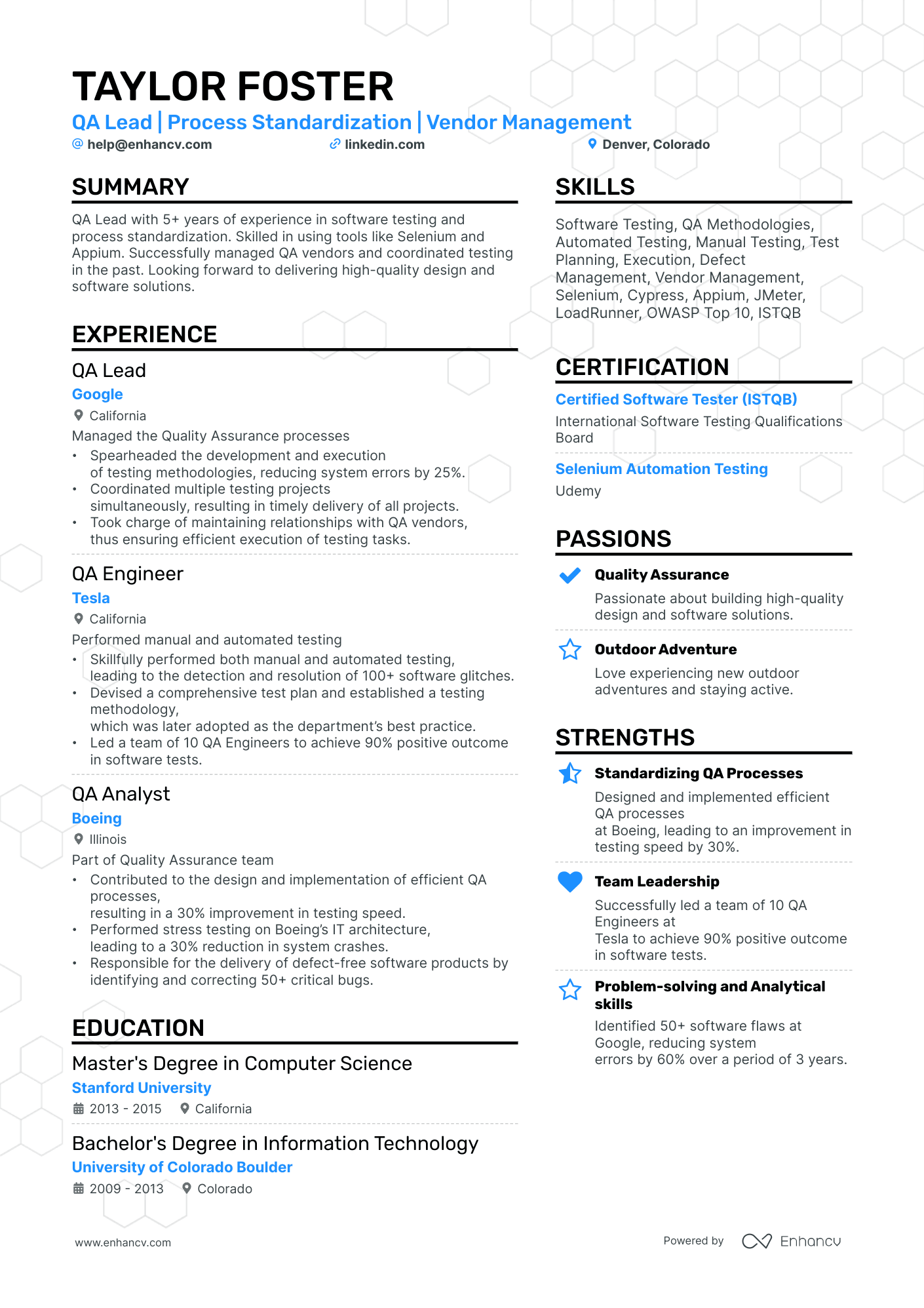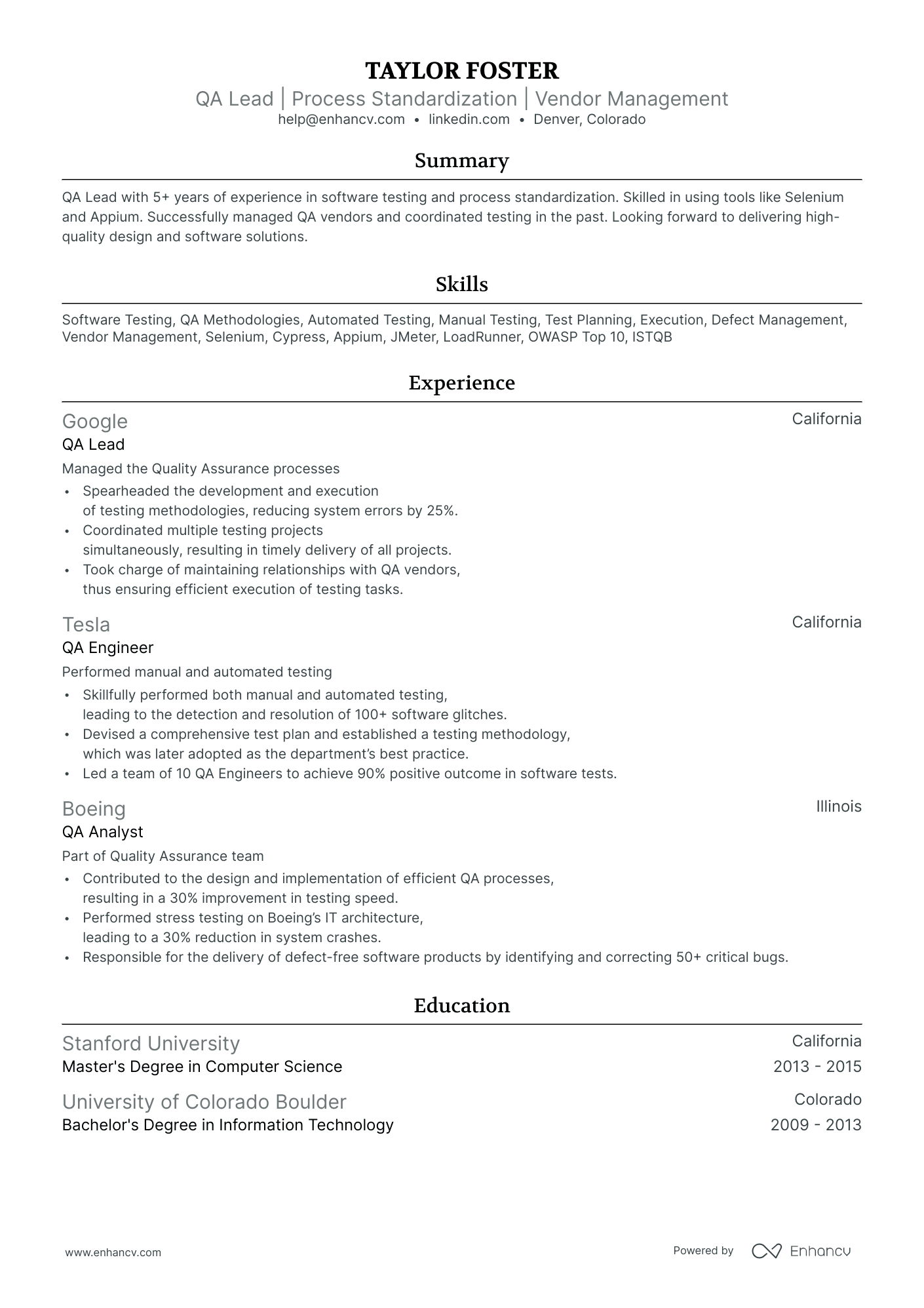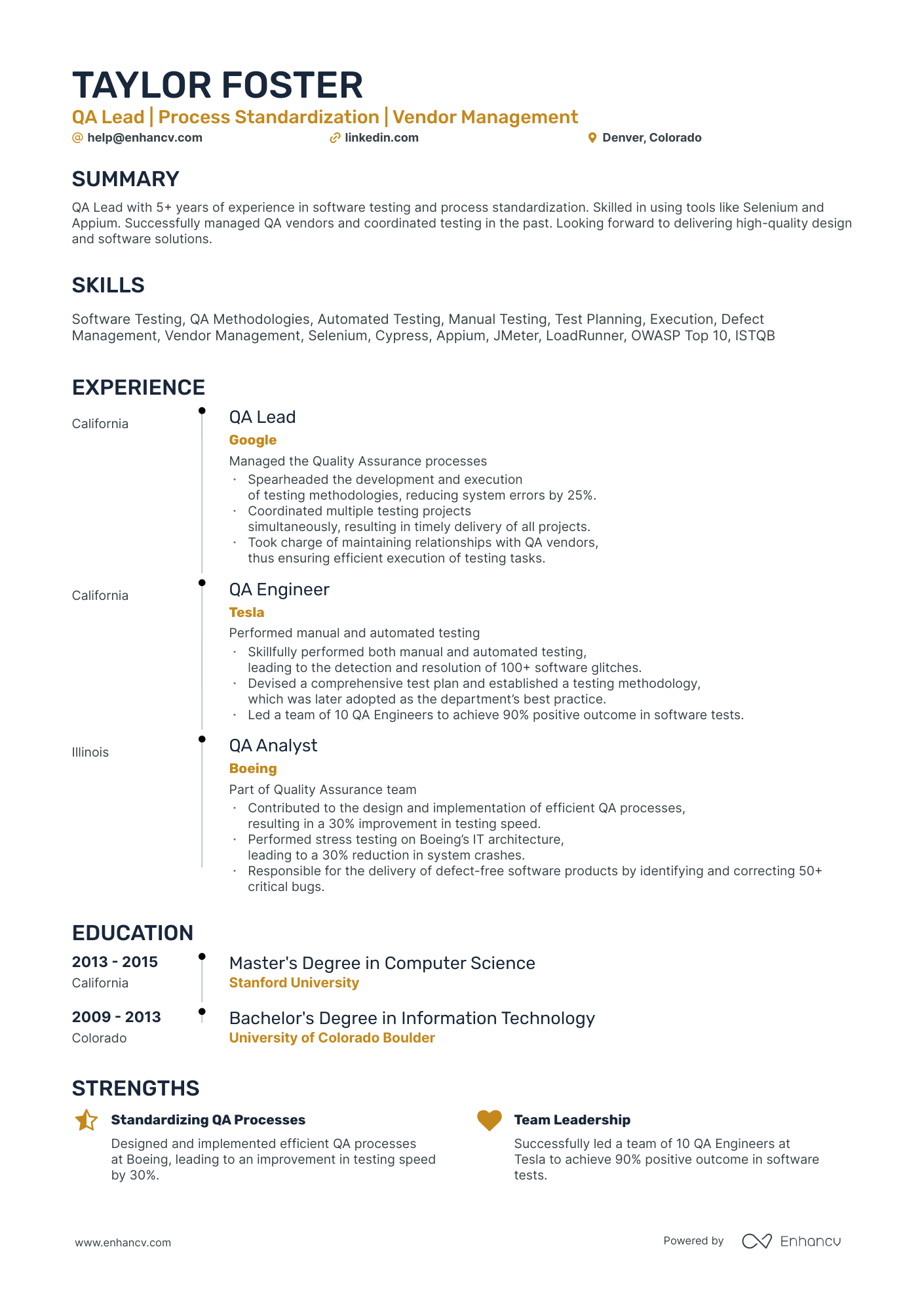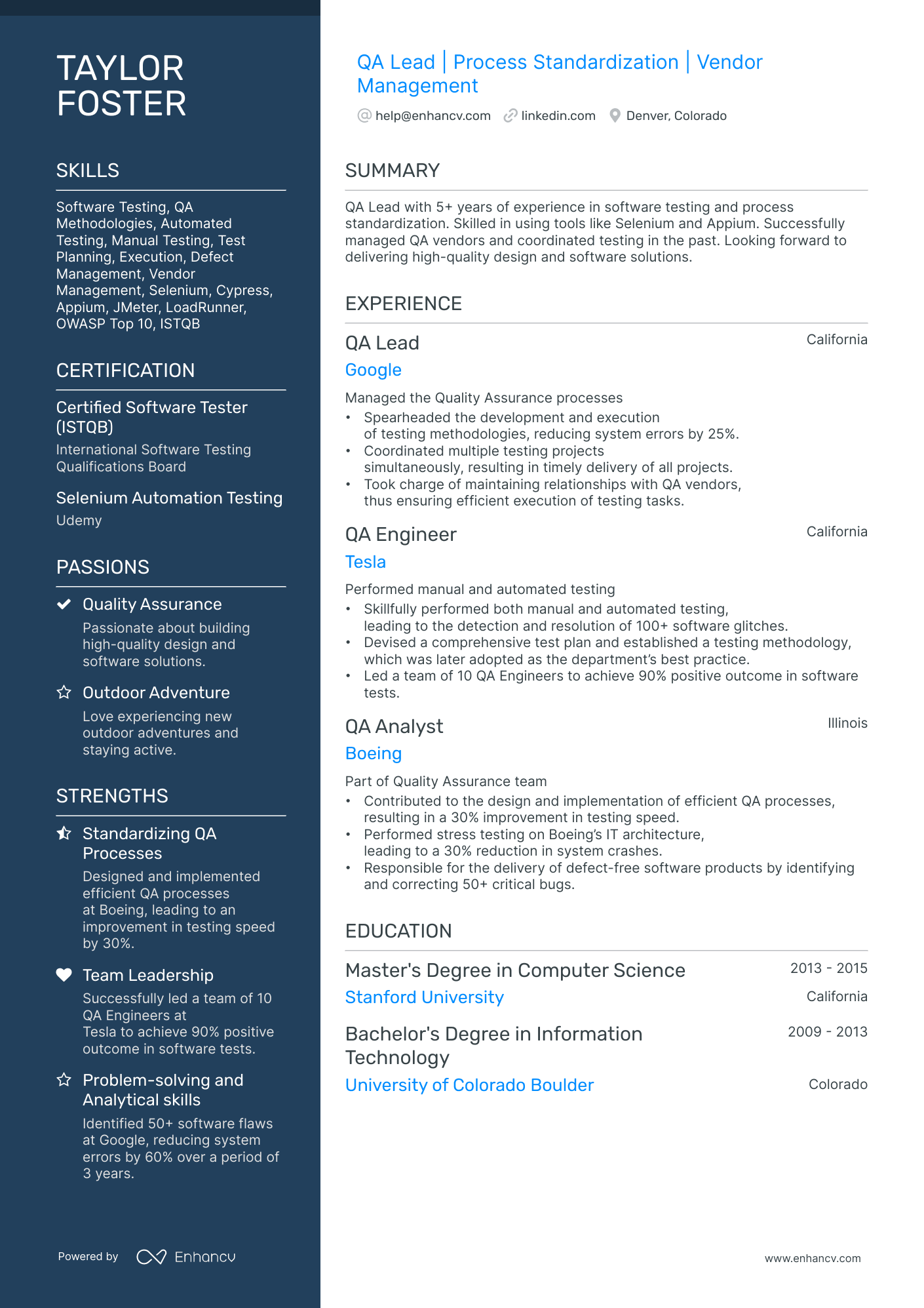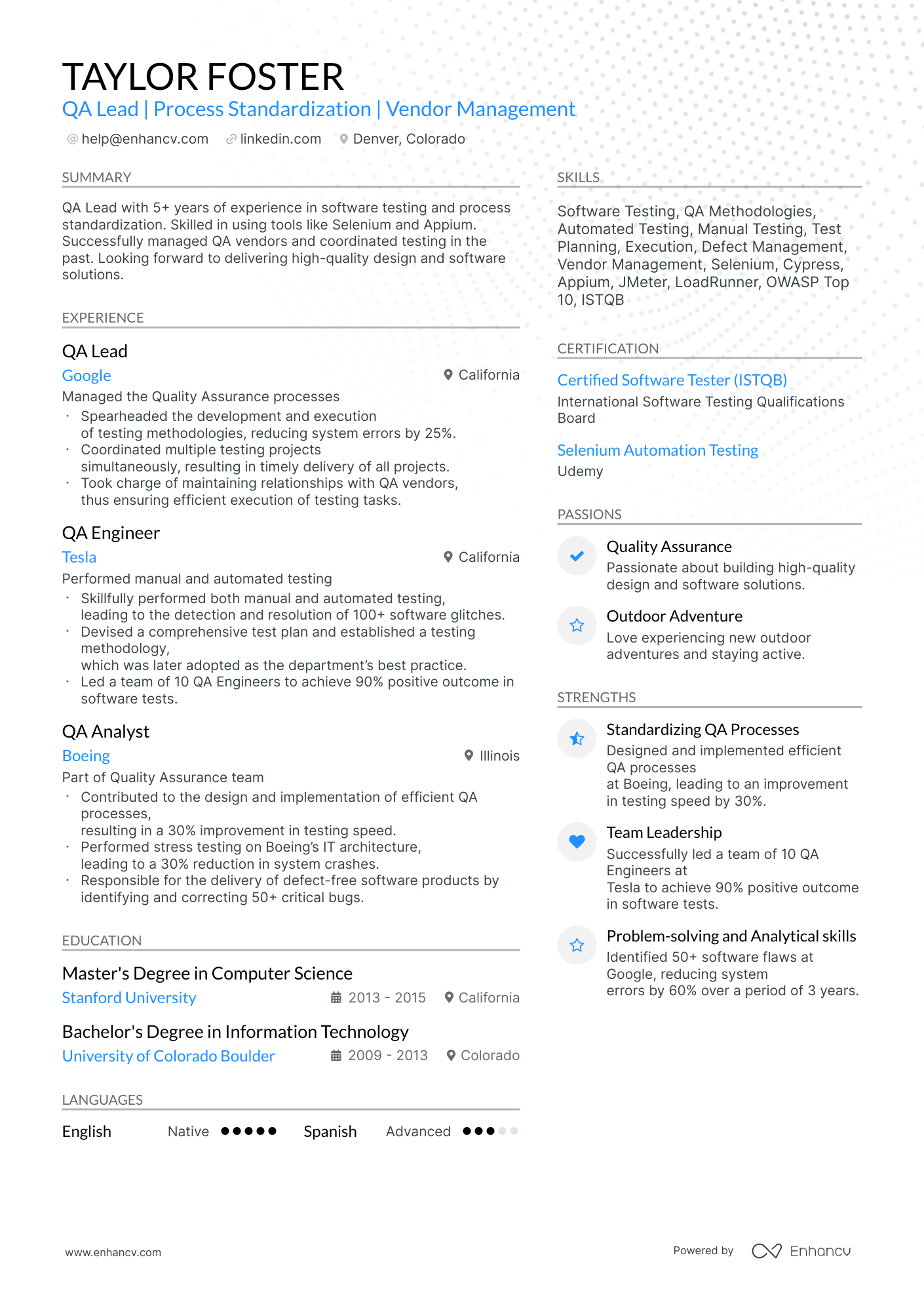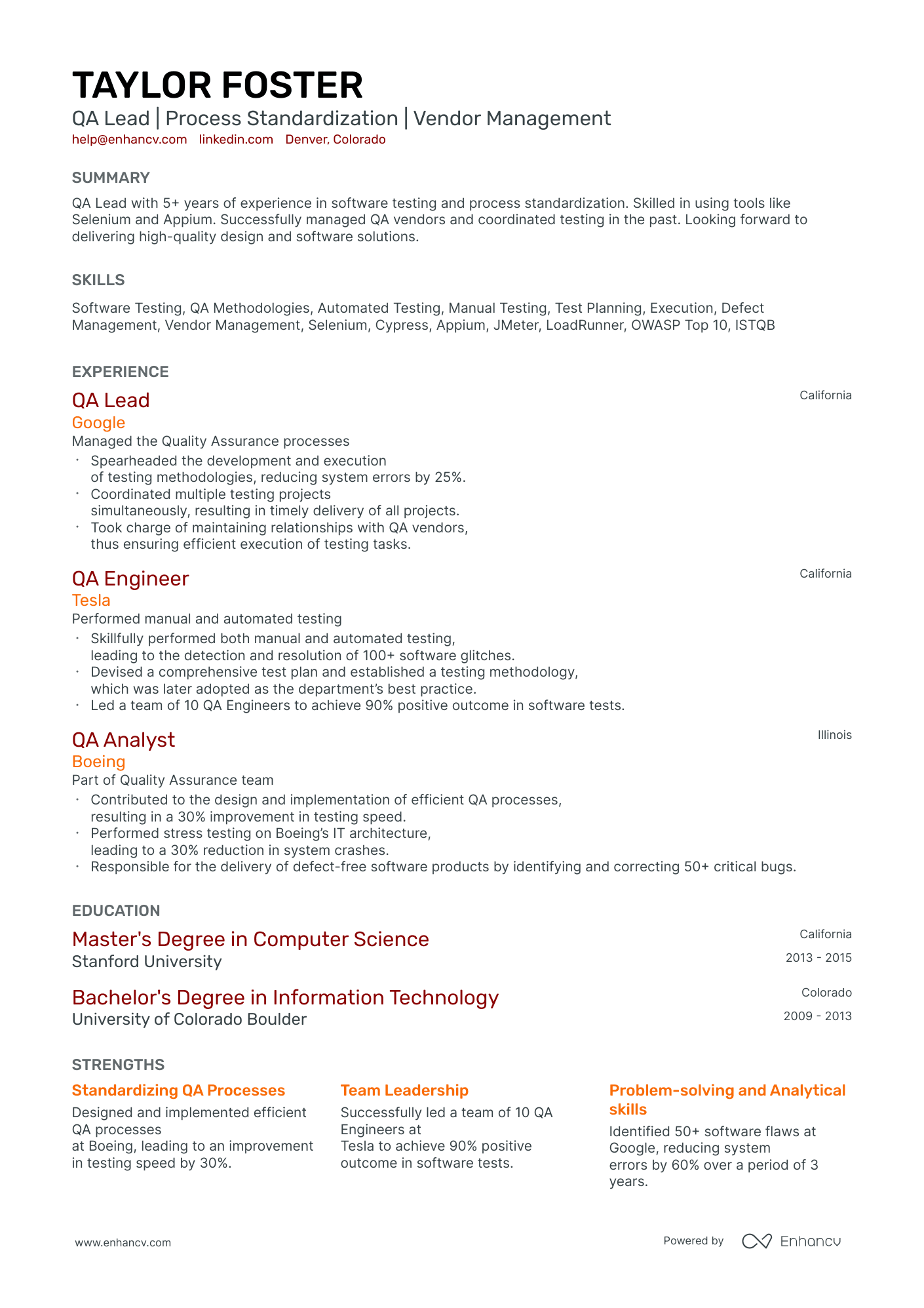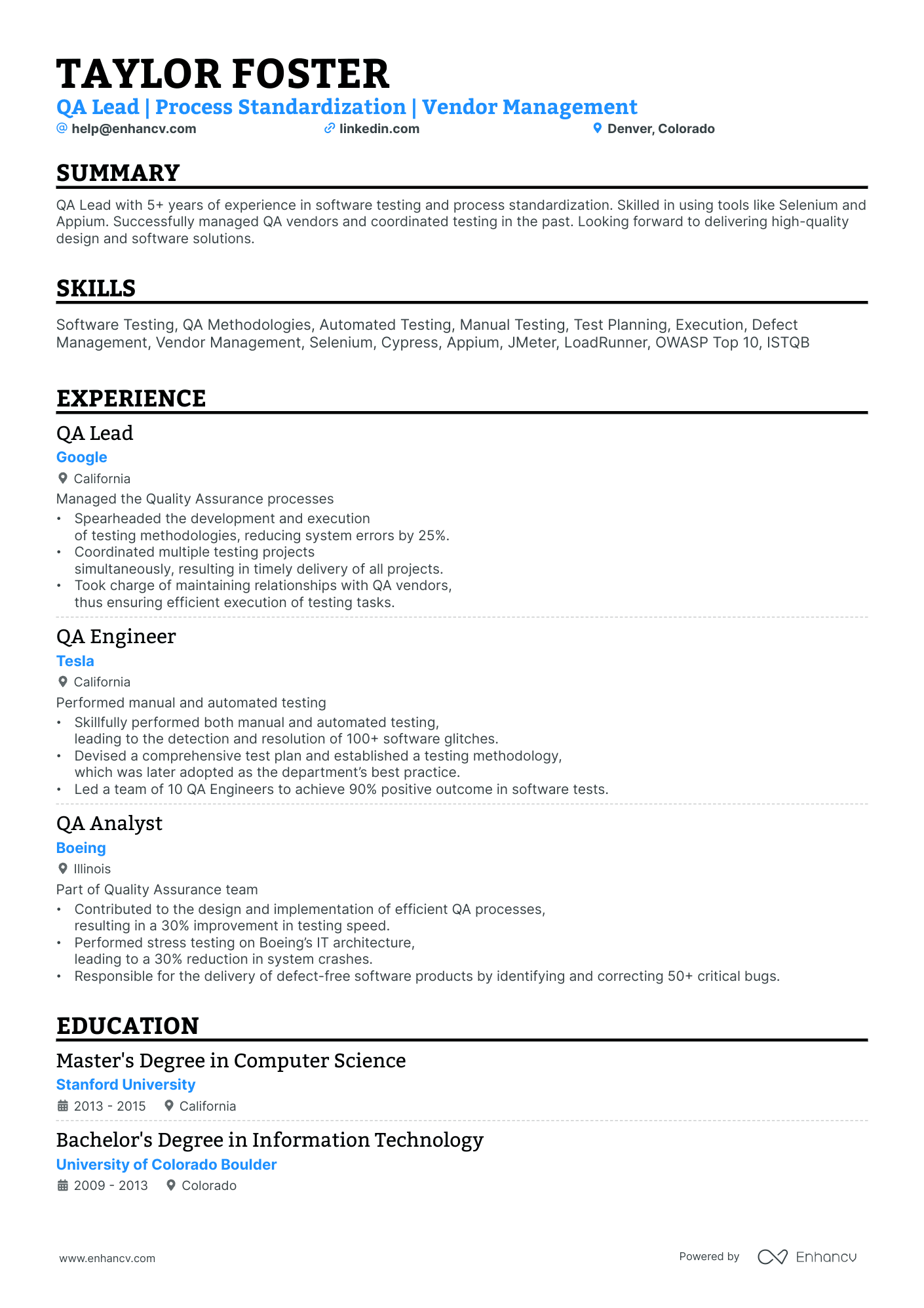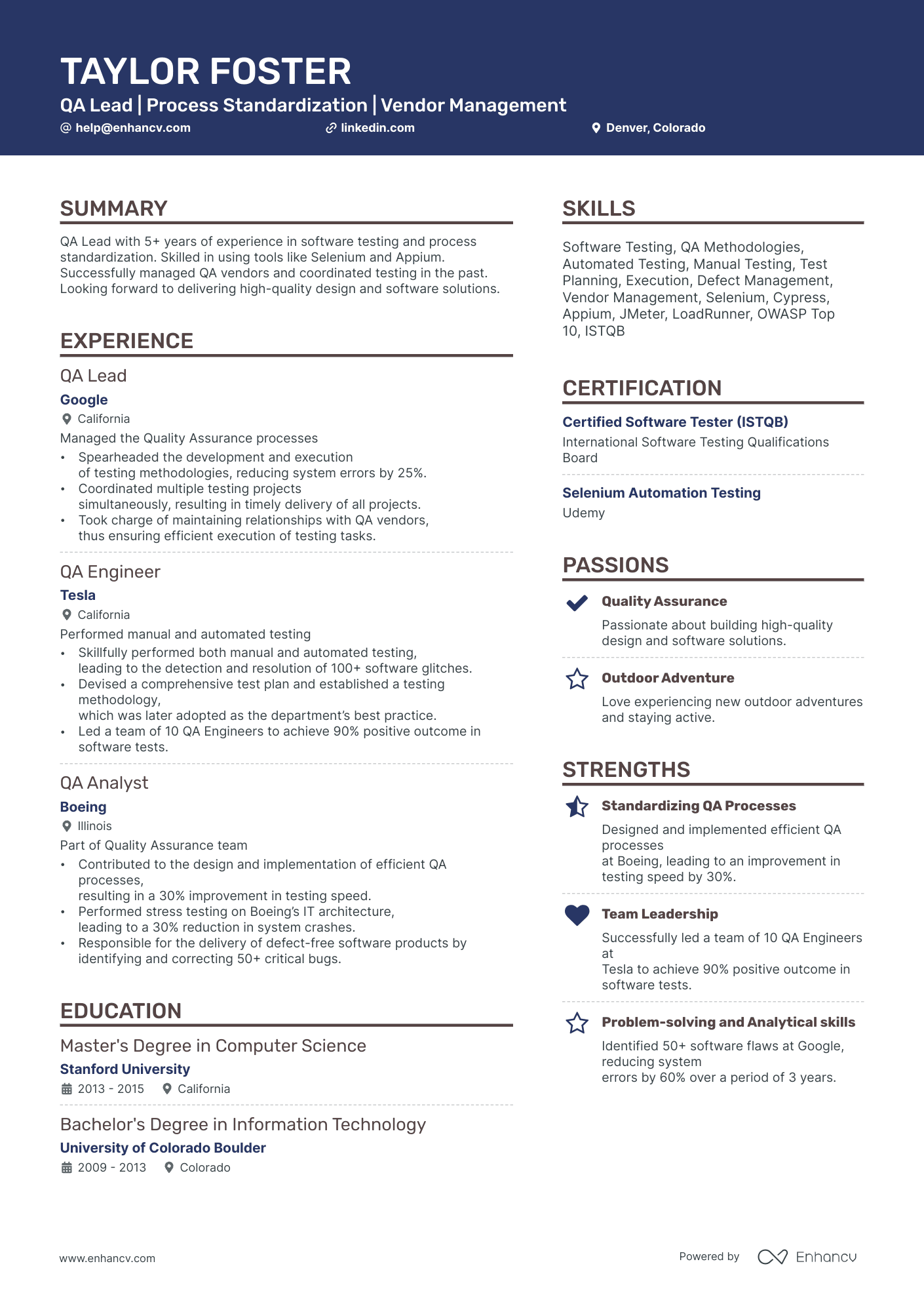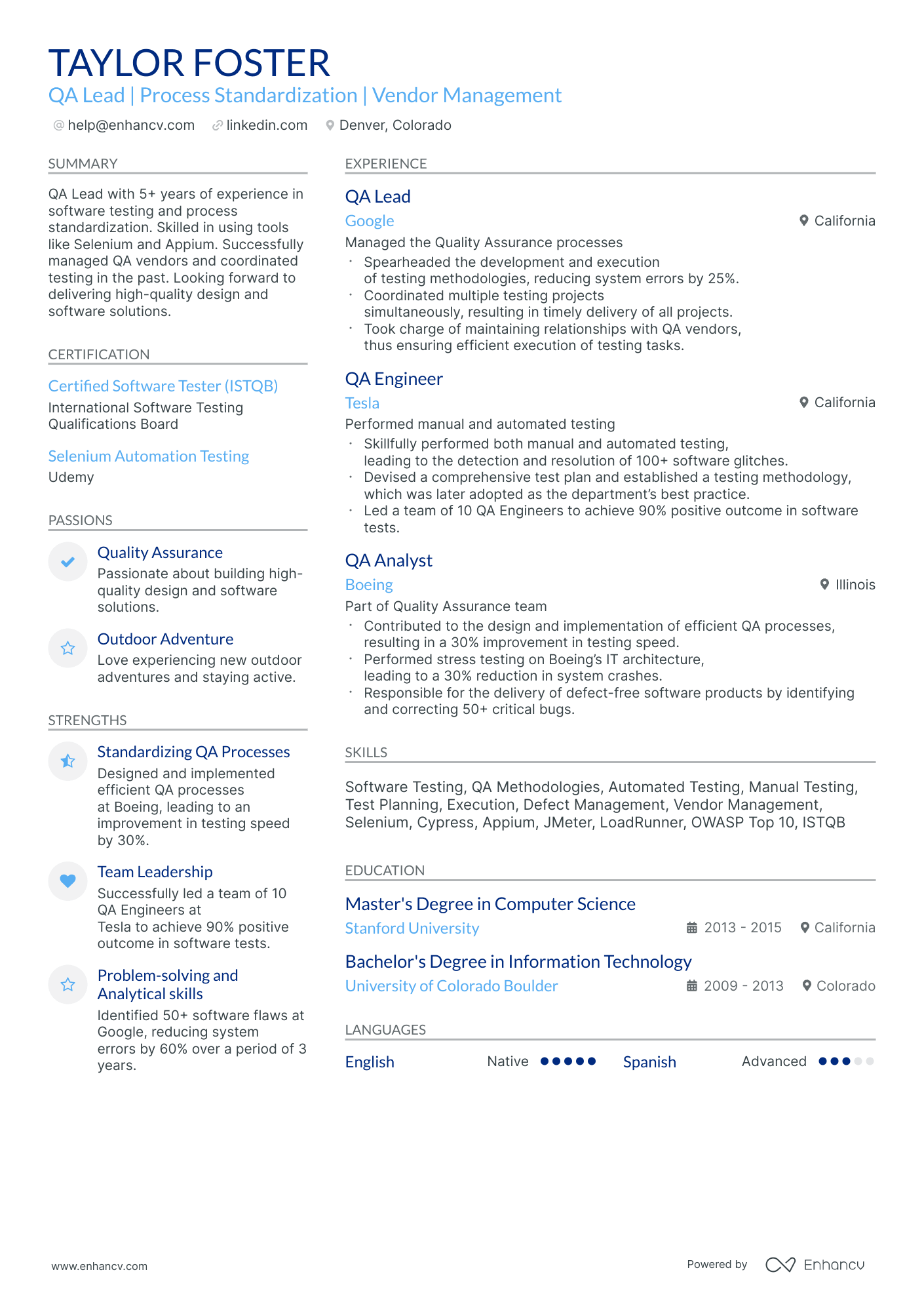A common challenge faced by QA leads is effectively articulating their technical skills and project management experience in a concise yet compelling manner on their resumes. Our guide can assist by providing targeted examples and templates, allowing QA leads to highlight their key competencies and achievements in an attractively organized and easily digestible format.
Stay tuned for more ideas on how to write your QA lead resume:
- Find different QA lead resume examples to serve as inspiration to your professional presentation.
- How to use the summary or objective to highlight your career achievements.
- How to create the experience section to tell your story.
- Must have certificates and what to include in the education section of your resume.
Recommended reads:
Designing your QA lead resume: best practices
Before penning down your QA lead resume, consider its structure and format. Here's what you should remember:
- Employ the reverse-chronological format to present your experience, starting with your most recent role.
- Your resume's header should feature accurate, professional contact details. If you maintain a professional portfolio or LinkedIn profile, include its link.
- Keep your resume concise, ideally within two pages. Prioritize relevance over length.
- Unless directed otherwise, save your resume as a PDF to preserve its design.
Upload your resume
Drop your resume here or choose a file. PDF & DOCX only. Max 2MB file size.
Pro tip
Keep your QA lead resume clear and concise. Top professionals narrate their career stories while highlighting their strengths.
Essential sections for your product specialist resume, favored by recruiters:
- A clear header with pertinent links and contact information.
- A concise summary or objective, offering a snapshot of your career milestones and your fit for the product specialist role.
- An experience section detailing your professional qualifications and achievements.
- Skills sections that align your talents with job-specific keywords and requirements.
- Education and certifications sections that underscore your dedication to industry-specific growth.
What recruiters want to see on your resume:
- Experience with QA methodologies: Demonstrated knowledge of various quality assurance methodologies, practices, and procedures.
- Technical Skills: Familiarity with different types of testing tools and languages (like Selenium, JMeter, or SQL), as well as experience in automation scripting is often required.
- Leadership Experience: Previous responsibility in leading a team, coordinating projects, and managing resources effectively.
- Problem-solving Skills: Ability to identify issues quickly and implement effective solutions, demonstrating critical thinking capabilities.
- Communication Skills: Excellent written and verbal communication skills for coordinating between team members, stakeholders, and other departments.
Recommended reads:
The experience section of your QA lead resume: your professional journey
The experience section is your platform to narrate your professional story. Recruiters scrutinize this section to gauge your unique value proposition.
Here are five steps to craft a compelling experience section:
- Highlight relevant roles, including the company, role description, and tenure, supported by up to six bullet points per role.
- Emphasize tangible outcomes of your contributions, using quantifiable metrics where possible.
- Integrate positive feedback or endorsements to bolster your claims.
- Ensure verb tense consistency when detailing responsibilities.
- Summarize significant achievements relevant to each role.
Explore how seasoned QA lead professionals have crafted their experience sections to secure roles at industry-leading firms.
- Led a team of QA engineers to ensure high-quality software delivery for major client projects.
- Developed and implemented comprehensive test strategies, resulting in a 20% reduction in post-release defects.
- Collaborated closely with cross-functional teams to identify, prioritize, and resolve critical issues in a timely manner.
- Designed and executed complex test scenarios, including performance, scalability, and compatibility testing.
- Mentored junior QA engineers, providing guidance on best practices and promoting professional development.
- Managed end-to-end quality assurance efforts for multiple software development projects.
- Implemented test automation frameworks, resulting in a 30% reduction in testing time.
- Conducted risk analysis and developed mitigation strategies to ensure project success.
- Collaborated with product owners to define acceptance criteria and validate the implementation.
- Coordinated offshore testing teams, ensuring seamless communication and efficient knowledge transfer.
- Established quality assurance processes and standards, improving overall software quality by 15%.
- Assisted in the recruitment and training of QA engineers to build a high-performing team.
- Led defect triage meetings and facilitated effective communication between development and QA teams.
- Performed root cause analysis on critical defects, driving process improvements and preventing recurrence.
- Collaborated with stakeholders to define test objectives, scope, and deliverables.
- Managed the quality assurance process for mobile application development projects.
- Implemented agile testing methodologies, resulting in a 25% increase in efficiency.
- Led the successful launch of several high-profile mobile apps with zero critical defects reported post-release.
- Developed and executed comprehensive test plans, including functional, usability, and localization testing.
- Conducted performance testing to optimize app responsiveness, resulting in a 50% reduction in load times.
- Coordinated and supervised the activities of the QA team, ensuring timely completion of testing milestones.
- Developed and implemented a regression testing framework, reducing rework efforts by 30%.
- Identified and resolved critical issues, improving overall software stability by 20%.
- Collaborated with product managers to define user stories and acceptance criteria.
- Served as the primary point of contact for QA-related discussions with clients and stakeholders.
- Leading a team of QA engineers in the testing and quality assurance of web applications.
- Implementing continuous integration and deployment pipelines to streamline the testing process.
- Developing and maintaining test automation frameworks using industry-leading tools.
- Collaborating with development teams to ensure effective bug reporting and resolution.
- Conducting risk assessments and implementing mitigation strategies to minimize project risks.
- Managed a team of QA engineers in the testing and quality assurance of enterprise software solutions.
- Implemented performance testing processes, resulting in a 40% improvement in application response times.
- Collaborated with cross-functional teams to define and implement quality standards and best practices.
- Led defect management efforts, ensuring prompt identification, prioritization, and resolution of issues.
- Provided technical guidance and mentorship to junior QA team members.
- Led a team of QA analysts in the testing and quality assurance of e-commerce platforms.
- Developed and executed comprehensive test plans, including functional, security, and integration testing.
- Identified critical security vulnerabilities and collaborated with development teams to address them.
- Implemented test automation techniques, resulting in a 30% reduction in regression testing effort.
- Led root cause analysis efforts and implemented corrective actions for production defects.
- Managed a team of QA engineers, ensuring high-quality software delivery for client projects.
- Implemented test strategies and methodologies to improve overall testing efficiency by 25%.
- Collaborated with development teams to define and implement coding standards and best practices.
- Conducted training sessions on QA processes and tools for new team members.
- Performed risk assessments and implemented mitigation plans to minimize project risks.
- Oversaw quality assurance activities for complex software systems, ensuring adherence to industry standards.
- Developed and implemented test strategies, resulting in a 15% improvement in overall product quality.
- Collaborated with cross-functional teams to identify and resolve critical issues during the development lifecycle.
- Led the successful completion of multiple large-scale projects within schedule and budget constraints.
- Provided guidance and mentorship to junior QA team members, fostering their professional growth.
Quantifying impact on your resume
<ul>
Navigating the resume landscape without experience
It's not uncommon for candidates lacking direct experience to secure entry-level positions. Their resumes often share these characteristics:
- They opt for a functional or skill-based format, emphasizing strengths over chronological work history.
- Transferrable skills, gleaned from diverse life and work experiences, take center stage.
- The objective section melds career highlights, the motivation behind the application, and the unique value proposition for the role.
- Skills are tailored to meet basic job prerequisites while also spotlighting any specialized expertise.
Recommended reads:
Pro tip
If your experience section doesn't directly address the job's requirements, think laterally. Highlight industry-relevant awards or positive feedback to underscore your potential.
Essential QA lead resume skills
When recruiters review QA lead resumes, they're looking for a mix of technical know-how and personal attributes.
Technical skills demonstrate your proficiency in specific tools or tasks. They indicate if you're ready to jump into the role or if you'll need extensive training.
On the other hand, soft skills reflect your interpersonal abilities. They show how you'll fit into a team or company culture.
To effectively present these skills on your resume:
- Design a skills section that highlights both your technical and interpersonal strengths.
- Provide examples where you've applied these skills, such as projects or tasks.
- For soft skills, describe situations where they've been crucial to your success.
- Use metrics, like improved efficiency or positive feedback, to validate your skills.
For inspiration, explore the preferred skills of leading QA lead professionals.
Top skills for your QA lead resume:
Selenium
JUnit
TestNG
JIRA
Git
Postman
LoadRunner
SQL
Cucumber
Continuous Integration (CI) tools
Leadership
Communication
Problem-solving
Analytical thinking
Time management
Collaboration
Attention to detail
Adaptability
Conflict resolution
Mentoring
Pro tip
Don't go all over the place with your skills section by listing all keywords/ buzzwords you see within the ad. Curate both hard and soft skills that are specific to your professional experience and help you stand out.
Highlighting education and certification on your QA lead resume
Your education section is a testament to your foundational knowledge and expertise.
Consider:
- Detailing your academic qualifications, including the institution and duration.
- If you're still studying, mention your anticipated graduation date.
- Omit degrees that aren't pertinent to the job.
- Highlight academic experiences that underscore significant milestones.
For QA lead roles, relevant education and certifications can set you apart.
To effectively showcase your qualifications:
- List all pertinent degrees and certifications in line with the job requirements.
- Include additional certifications if they bolster your application.
- Provide concise details: certification name, institution, and dates.
- If you're pursuing a relevant certification, indicate your expected completion date.
Your education and certification sections validate both your foundational and advanced knowledge in the industry.
Best certifications to list on your resume
- Certified Quality Auditor (CQA) - American Society for Quality (ASQ)
- Certified Software Quality Engineer (CSQE) - American Society for Quality (ASQ)
- Certified Software Quality Analyst (CSQA) - QA Certification Board
- OMG Certified Systems Modeling Professional (OCSMP) - Object Management Group (OMG)
- Microsoft Certified: Azure DevOps Engineer Expert - Microsoft
Pro tip
If you're in the process of obtaining your certificate or degree, list the expected date you're supposed to graduate or be certified.
Recommended reads:
Choosing the right QA lead resume summary or objective
The top section of your resume is pivotal. It should encapsulate your alignment with the job, your unique skill set, and your professional expertise.
Both the resume summary and resume objective can serve this purpose:
- Use the resume objective to spotlight your current achievements and future aspirations. Highlight how you envision your growth in the prospective role.
- Opt for the resume summary to succinctly present your most relevant professional highlights. Aim for brevity, ideally within five sentences.
Ultimately, these sections offer a glimpse into your professional persona and the unique value you bring.
Resume summary and objective examples for a QA lead resume
Extra sections to boost your QA lead resume
Recruiters love candidates who offer more. Share your personality or extra industry credentials. Consider adding:
- Projects showcasing standout work.
- Top awards or recognitions.
- Relevant publications.
- Hobbies and interests that reveal more about you.
Key takeaways
- Your resume's layout should be both visually appealing and content-rich.
- Emphasize achievements that resonate with the job's requirements.
- Detail your skills, both technical and interpersonal, with real-world examples.
- Ensure the top section of your resume provides a clear snapshot of who you are and what you offer.
- When detailing experience, focus on tasks, actions, and their outcomes.
